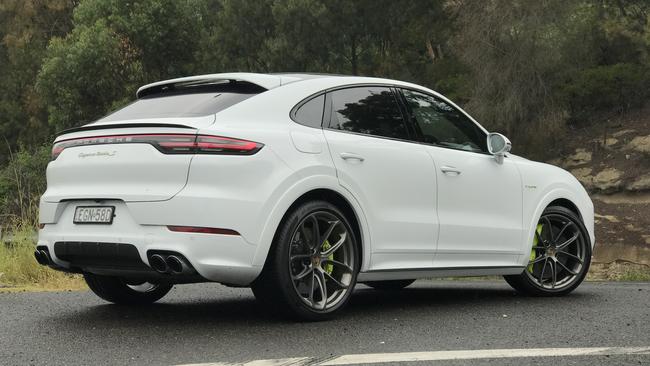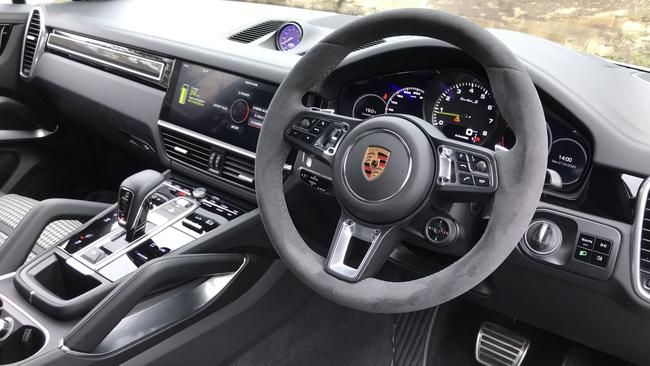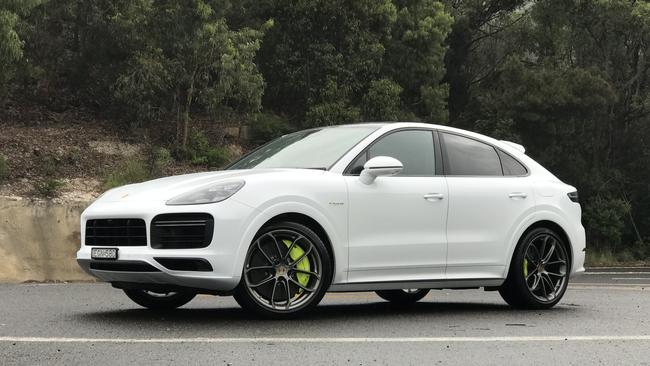Porsche Cayenne Coupe Turbo S e-Hybrid review: Porsche’s most powerful is a family car
When you think of powerful Porsches, a sleek sports car will spring to mind, but the brand’s most powerful isn’t what you think it is.
New cars
Don't miss out on the headlines from New cars. Followed categories will be added to My News.
The most powerful Porsche is a family car.
Truly, if you walk into a Porsche dealership and ask for the most powerful car currently offered by the brand, you’ll get a four-door Cayenne or Panamera.
Tested here in new Cayenne Coupe form, the “Turbo S e-hybrid” combines a twin-turbocharged, 404kW petrol V8 with a 100kW electric motor and 14.1kWh battery.
The result is a 500kW, 900Nm beast that represents a seriously clever – and potent – motoring solution.

IT’S MEAN AND GREEN
The 500kW club is an elite one, home to supercars such as Lamborghini’s Aventador, McLaren’s 720S and the Ferrari 812 GTS. So you shouldn’t be surprised to hear the most potent Cayenne rips to 100km/h in a claimed 3.8 seconds en route to a 295km/h top speed.
Driven sensibly with a full battery, the Cayenne returns an official fuel figure of 4.4L/100km – less than a well-equipped Toyota Camry Hybrid. Like all plug-in hybrids, the fuel economy figure must be taken with a fistful of salt, as the Porsche can run on battery power alone for around 40 kilometres (at speeds up to 135km/h) before switching to petrol propulsion.
There are many different driving modes and settings for the car’s systems, allowing you to choose whether to gun for peak performance, maximum efficiency or somewhere in between. Managing its battery for peak economy or performance is rewarding, and you can argue that it’s part of Porsche’s motorsport DNA as drivers in Formula 1, Le Mans or the electric Formula E series must master energy management in order to succeed.

THAT SOUNDS LIKE FUN
It is – the tech is like a video game, and the hybrid Cayenne Turbo is hilariously quick and composed in the right conditions. Variable-height air suspension, rear-wheel-steering, active roll bars and whopping 22-inch wheels with carbon ceramic brakes conspire to warp physics. It’s genuinely engaging to drive, capable of springing surprises long after the initial honeymoon period is over.

BET IT’S NOT CHEAP, THEN
There’s the catch. Priced from $292,600 plus on-road costs (about $320,000 drive-away), the range-topping Cayenne coupe isn’t cheap. Our test example brought $42,000 in optional extras, including a $22,000 lightweight sport package bringing carbon fibre elements, 22-inch wheels, a sports exhaust and more. We’ll debate the value of a “lightweight” pack on a two-tonne-plus SUV another time – it’s a little like ordering a fully-loaded burger with fries and ice cream washed down by diet cola.
It doesn’t help that Porsche charges extra for stuff like lane keeping assistance and active cruise control which are free on the cheapest Toyota Yaris.
PORSCHE HAS OTHER OPTIONS FOR YOU
Customers who want to go without hybrid power can save about $40,000 by choosing the conventional Cayenne Turbo, making do with only 404kW of power.
Those who want to double down on electrification should consider the fully electric Taycan sedan, which starts at about $210,000 drive-away and runs to about $365,000 for the fully-loaded Taycan Turbo S. A high-riding “Cross Turismo” wagon version with loose parallels to Subaru’s Outback arrives next year for those who want more space.
Originally published as Porsche Cayenne Coupe Turbo S e-Hybrid review: Porsche’s most powerful is a family car


